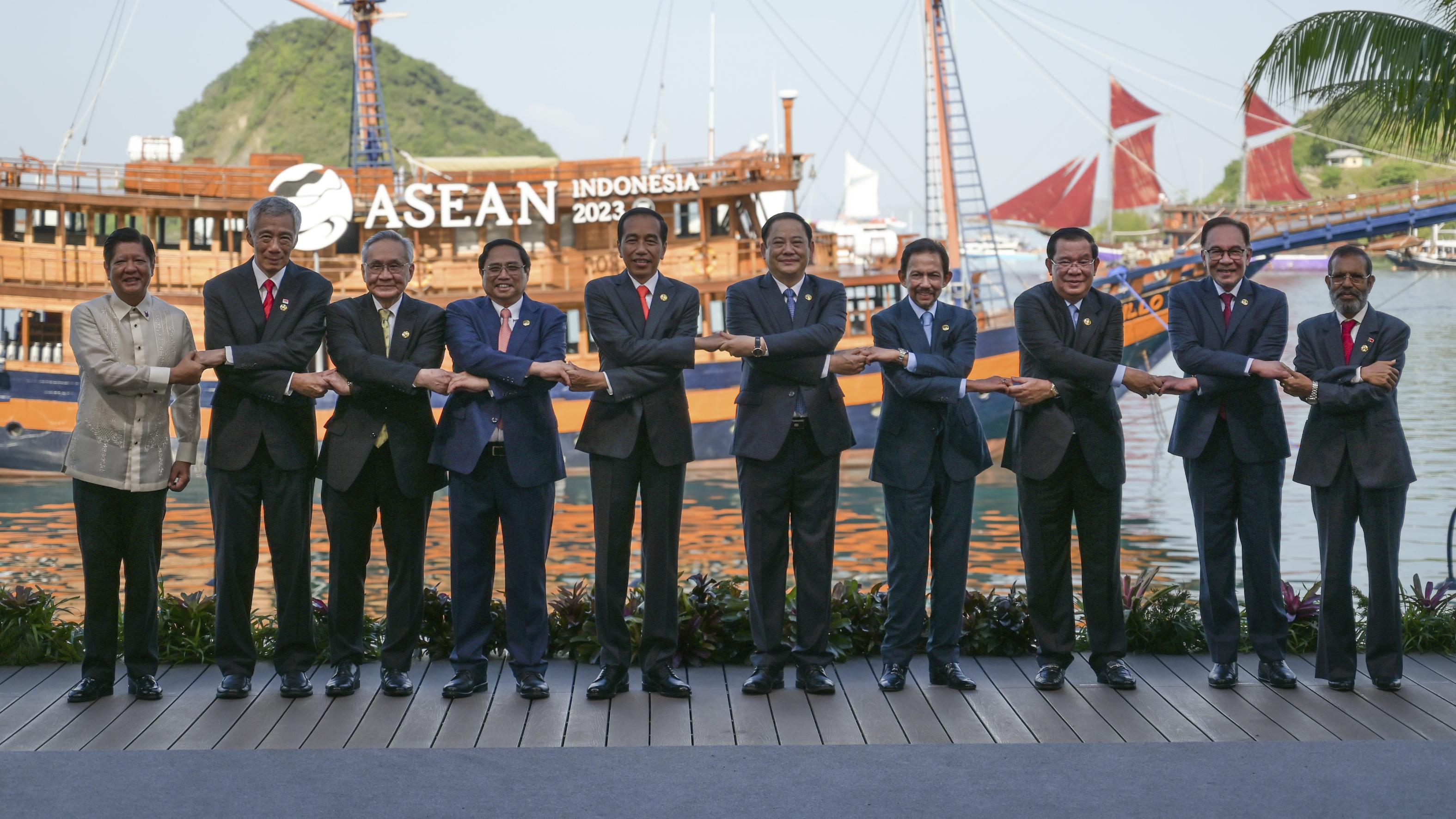Southeast Asian leaders call for unity, stronger cooperation amid uncertain world
 Indonesia's President Joko Widodo (fifth from left) and other leaders attending the 42nd ASEAN Summit hold hands for a group photo in Labuan Bajo, Indonesia, on May 10, 2023. (PHOTO / AP)
Indonesia's President Joko Widodo (fifth from left) and other leaders attending the 42nd ASEAN Summit hold hands for a group photo in Labuan Bajo, Indonesia, on May 10, 2023. (PHOTO / AP)
Leaders of the Association of Southeast Asian Nations (ASEAN) kicked off a two-day conference on May 10 by stressing the region’s role as a center of global economic growth.
Indonesian President Joko Widodo, who is this year’s rotating chairman of ASEAN, welcomed the bloc’s leaders as the meeting began in Labuan Bajo, a fishing village at the western tip of Flores Island in Indonesia’s East Nusa Tenggara Province. With the Flores Sea as a backdrop, Widodo delivered his opening remarks, citing geopolitical uncertainties and how the global economy is yet to fully recover from the pandemic.
“The question is, would ASEAN remain a spectator? Would ASEAN remain silent? Would ASEAN be capable of becoming a driver for peace and growth? I am sure we all believe that ASEAN can, provided that (we stick to) this key: unity,” Widodo said.
Widodo said a united ASEAN will be able to be a central player in bringing peace and development. He added that the group must strengthen its economic integration, bolster inclusive cooperation, including the implementation of the Regional Comprehensive Economic Partnership trade pact, and strengthen the health, food, and energy architecture, as well as maintain financial stability.
“Let us work hard to make ASEAN matters, an epicenter of growth,” Widodo said, echoing the theme of this year’s summit — “ASEAN Matters: Epicentrum of Growth”.
The leaders’ meeting is part of the 42nd ASEAN Summit, which comprises a series of events from May 8 to 12. It is the first of the two summits scheduled for this year. The 43rd ASEAN Summit and the East Asia Summit will be held in September in Jakarta.
Mark Richard Thompson, director of the Southeast Asia Research Center at the City University of Hong Kong, said Indonesia is “ideally placed” as this year’s rotating chair of the regional bloc as the archipelago is an “economic success story”.
This, he said, is a reflection of ASEAN’s economic growth. Citing data from the Asian Development Bank, Thompson praised the region’s ability to rebound from the pandemic.
The ADB has said that strong tourism performance and robust domestic demand are boosting the Southeast Asian economies, and has forecast the region’s GDP to grow by 4.7 percent this year and 5 percent in 2024.
Thompson credited Indonesia’s support for Timor-Leste’s bid to become a member of ASEAN, noting that the regional bloc has a history of bringing in members even across the ideological divide.
ASEAN agreed in principle to admit Timor-Leste to be its 11th member, at the bloc’s November 2022 summit chaired by Cambodia. One of the expected outcomes of this year’s summit is a roadmap for Timor-Leste’s full membership.
Timor-Leste Prime Minister Taur Matan Ruak, who attended the ASEAN leaders’ meeting as an observer, thanked Widodo for inviting him to take part in the summit.
“This is my first time attending ASEAN Summit and this provides a new chapter for the history of our country,” Ruak said.
Timor-Leste is developing its infrastructure so that it can meet its obligations as an ASEAN member, he added. These obligations include expanding the international airport in the capital city of Dili and establishing optical cables for secure communication.
On May 9, Indonesian Foreign Minister Retno Marsudi welcomed Ruak to the ASEAN summit, noting that President Widodo has highlighted the importance of economic cooperation with Timor-Leste.
Before a closed-door meeting of ASEAN foreign ministers, Marsudi stressed that ASEAN is currently at a crossroads, with multiple challenges including food and energy crises and global economic slowdown testing its strength as a community.
Marsudi urged actions against transnational crimes ranging from terrorism and money laundering to drugs and human trafficking, which she said not only threaten peace, stability and prosperity in the region but also hinder the process of community development.
While Myanmar’s leader was absent from the summit, a recent attack in the country was the subject of concern. “We condemned the attack and underlined that the perpetrators must be held accountable. We supported the efforts of the Chair of ASEAN, including its continued engagement with all stakeholders in Myanmar, to encourage progress in the implementation of the Five-Point Consensus,” an ASEAN leaders’ statement issued on May 11 said.
On May 7, unidentified armed men attacked a convoy carrying ASEAN aid workers and a monitoring team, including Indonesian and Singaporean diplomats, on their way to Shan State in eastern Myanmar. The convoy was bringing supplies to displaced people in the area.
Xinhua contributed to this story.
Leonardus Jegho is a freelance journalist for China Daily.
Contact the reporters at prime@chinadailyapac.com


